History beneath the soil
- Eurozine Review
16/2018
‘Blätter’ features Richard Sennett on open and closed cities; ‘Soundings’ analyses Britain’s Churchill complex; ‘La Revue nouvelle’ discusses Belgium’s buried history of WWI; ‘L’Homme’ fills gender gaps in centennial historiography; ‘Glänta’ considers truth, truths and modern lies; ‘il Mulino’ looks at perceptions and realities in Italy; and ‘New Humanist’ confronts scientific dogmas, phobias and prejudices.
Blätter für deutsche und internationale Politik (Germany) 12/2018
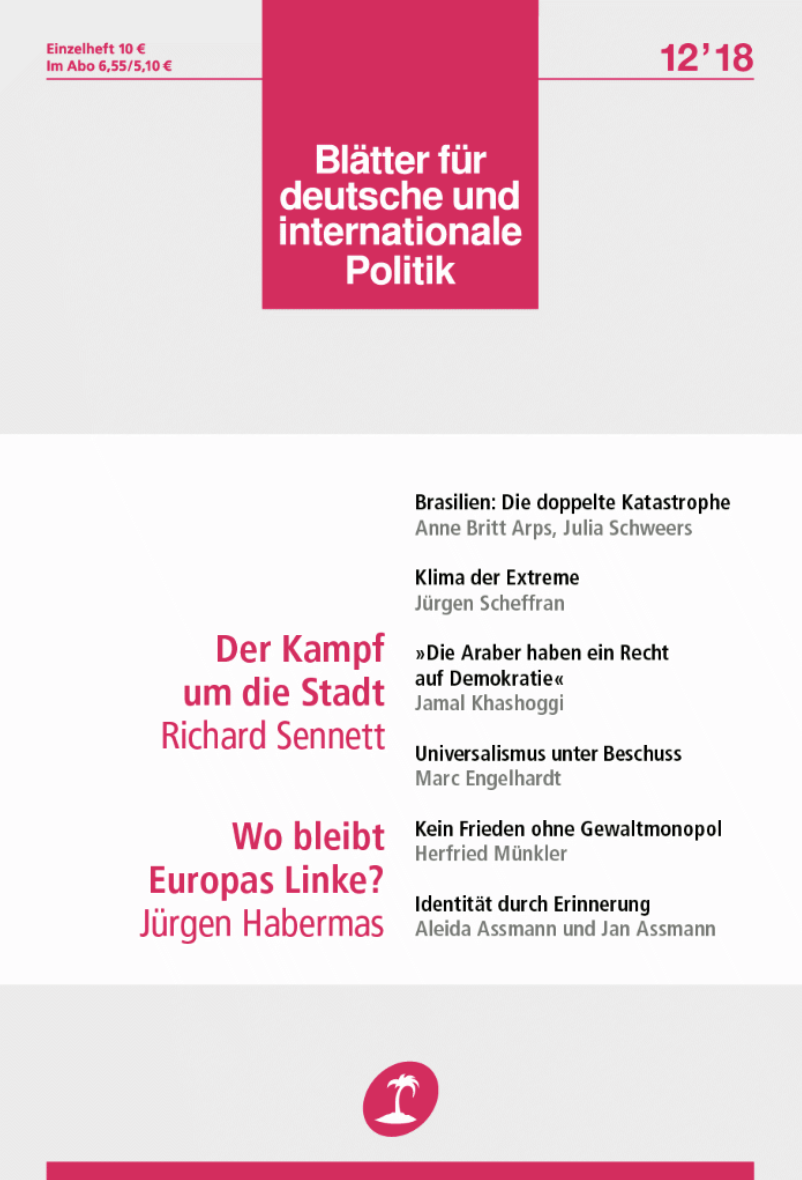
In Blätter, Richard Sennett proposes a distinction between ‘open’ and ‘closed’ cities: ‘I think that the great measure of closure today is that people don’t feel that they can deal with complexity, differences, things that aren’t familiar, people that they don’t like, situations which are unfamiliar. And this incapacity to deal with difference feeds into a capitalist economy that can profit from making people want to do only what is comfortable and familiar to them.’
The ‘open city’, in contrast, is as liberating as it is uncomfortable. Moreover, ‘there isn’t one image you can hold up and say: this is what all open cities should look like. There are alternatives that are themselves each problematic and each attractive and unattractive at the same time.’ The essay is based on Sennett’s Democracy Lecture, held in Berlin on 8 November, and is followed by a debate with Francesca Bria, Technology and Digital Innovation Officer for the City of Barcelona, and urbanist and Andrej Holm. The English version will be appearing in Eurozine in January.
Europe: Jürgen Habermas argues that the politics of national self-interest in Europe are not just down an ascendant far-right, but based on the ‘realistic perception’ that the monetary union no longer presents a ‘win-win’ situation. ‘The rigid system of rules’ imposed upon the eurozone has turned out to be ‘an arrangement in the interests of the economically more powerful members’. A European left is called for that supports the goal of economic convergence, while also seeking economic justice within the Union. Next year’s European elections will be a litmus test, Habermas thinks.
Also: Marc Engelhardt on the debate on the Global Compact on Migration and the pressure on human rights 70 years after the Universal Declaration; Herfried Münkler on what the Thirty Years’ War can tell us about the sociology of current conflicts and the prerequisites for stable peace; and Jürgen Scheffran on the risks of geo-engineering not just for the climate but also for global politics.
More articles from Blätter in Eurozine; Blätter’s website
Soundings (UK) 70 (2018)
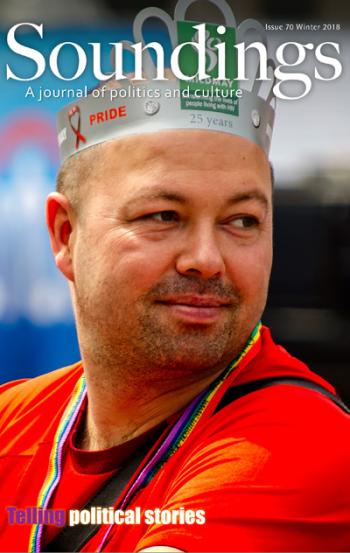
In Britain today, a burgeoning Churchill industry promotes an idea of the nation as a place of purpose and moral certainty. But Churchill’s historical record is not what conservatives would have it to be, argues Gerry Hassan in Soundings. ‘As moderate Conservatism has declined over the last forty years, so – first under Thatcher, then by her disciples – Churchill has been appropriated to invoke a belligerent, and ultimately triumphant, country.’
But, in the post-war era, ‘Churchillism’ showed an ability to adapt that is beyond the current political leadership in Britain, writes Hassan. Today, ‘we live in a society which has become fearful of the future and of change, and instead seeks sanctuary in imagined and contested versions of the past.’ Though this tendency is likely to worsen before it gets better, ‘eventually we will have to break this stranglehold’ and ‘find narratives capable of confronting the multiple crises of British politics and society.’
1968: Some see 1968 as having prepared the way for neoliberal consumerism and individualism, others regard it as the great disseminator of popular and anti-authoritarian politics. But when we revisit momentous events, writes Phil Cohen, we should not be looking for evidence that bolsters our own position. Instead we should be trying to capture their singularity, their divergence from the historical context in which they were embedded – in an effort to restore their potential for reconfiguring the present.
Dependence: Chronic illness forces people to rely on the state – and, if they are lucky, a network of friends. The formal social contract is often underpinned by this more personal one of support, writes Sarah Benton. Political discourse usually depends on creating resentment. But recognition of the blessing of gratitude can change your relation to friends, and to those working in state social and medical services.
More articles from Soundings in Eurozine; Soundings’ website
La Revue nouvelle (Belgium) 7/2018
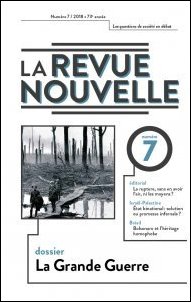
In a dossier to commemorate the centenary of 1918, La Revue nouvelle addresses the long-term aftermath of WWI in Belgium and beyond. From the material traces of trench warfare that are still visible today, to discrepancies in representations of the Great War among European students, the journal analyses the physical and mental scars incurred during a pivotal chapter in European history.
Geography of war: Élise Rezsöhazy and Gwendal Piégais examine the destruction wrought by the war on the Belgian and French landscapes. From Flanders to the Somme and the forests of Verdun, ‘these lands are more scarred, destroyed and flattened by war than any other battlefield still visible today’. The countryside was lacerated by the network of trenches and disfigured by bombings, while artillery shells and the remains of fallen soldiers continue to be unearthed. Numerous monuments along the former Western Front have been erected since the conflict, seeking to ‘introduce a new narrative of the Great War, which conceals what lies beneath the soil’.
Generational memory: Recent studies show divergent ‘memories’ of WWI among younger generations of Europeans, write Pierre Bouchat and Geneviève Warland. Asked what they associate with the Great War, students fell into two camps: those who focused on the concrete manifestations of war (the mud, the cold, the pain) and those who were concerned with its consequences (treaties, territory). Belgian students were noteworthy for the absence of national references in their answers. But there was a consensus that the war was brought about by ‘the elites in charge as opposed to innocent populations’.
Hate speech: The rise of hate speech is only the tip of the iceberg when it comes to online harassment, observes Renaud Maes, drawing on his own experience as a target of far-right trolling. Having received thousands of abusive and threatening emails for his political writings over the past few years, he has amassed a ‘corpus’ of private, anonymous messages to which he applies detailed semantic analysis. ‘This process of harassment is in fact a form of radicalization caused by the progressive disconnect from the real’.
More articles from La Revue nouvelle in Eurozine; La Revue nouvelle’s website
L’Homme (Austria) 2/2018
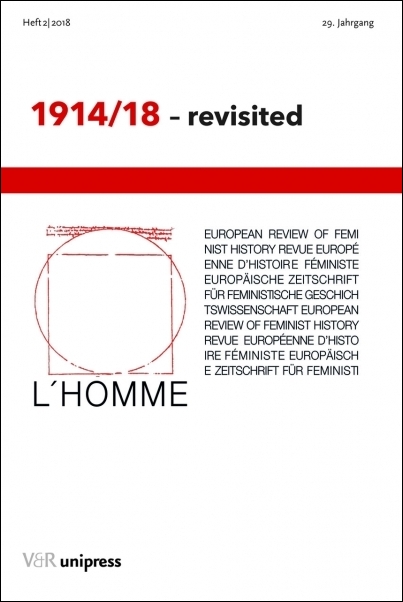
L’Homme looks at how feminist history has dealt the First World War – and how feminist history has been dealt with in the commemorative process. Female experiences vary widely, as do patterns of remembrance.
Marginalized history: Gender is still under-discussed in political and military history, which are likely to be depicted and gender-neutral fields.’ Angelika Schaser gives a detailed account of the centennial historiography of WWI in Germany and Austria, focusing on recent studies’ depiction of women’s history. It seems that historians who are not specially dedicated to a gendered viewpoint tend to depict female aspects as marginal and complimentary.
Progress reversed: The World Wars are commonly associated with the advance of women’s liberation (and also plastic surgery). In an interview with Christa Hämmerle, the historian Margaret R. Higonnet uses the concept of the ‘double helix’ to describe the zig-zag path of female advancement. ‘During World War One, governments advocated women’s short-term employment as substitutes for men mobilised to fight. After the war, however, demobilization drove hundreds of thousands of women out of their jobs, redirecting many to domestic labour, agriculture and service professions.’
Ambivalent masculinity: In early twentieth-century Germany, the military was an important ‘school of masculinity’, transmitting military models of behaviour to civilian life and cultivating practices of camaraderie, writes Benjamin Ziemann. Martin Niemöller is best known as a Lutheran pastor who opposed the Nazi regime and became a pacifist activist after the war. However, his early career in the imperial Navy is overlooked, even though it provides an entirely new perspective of his later life. This phase of Niemöller’s biography provides a rich source for understanding contradictor narratives of masculinity of the era.
More articles from L’Homme in Eurozine; L’Homme’s website
Glänta (Sweden) 2/2018
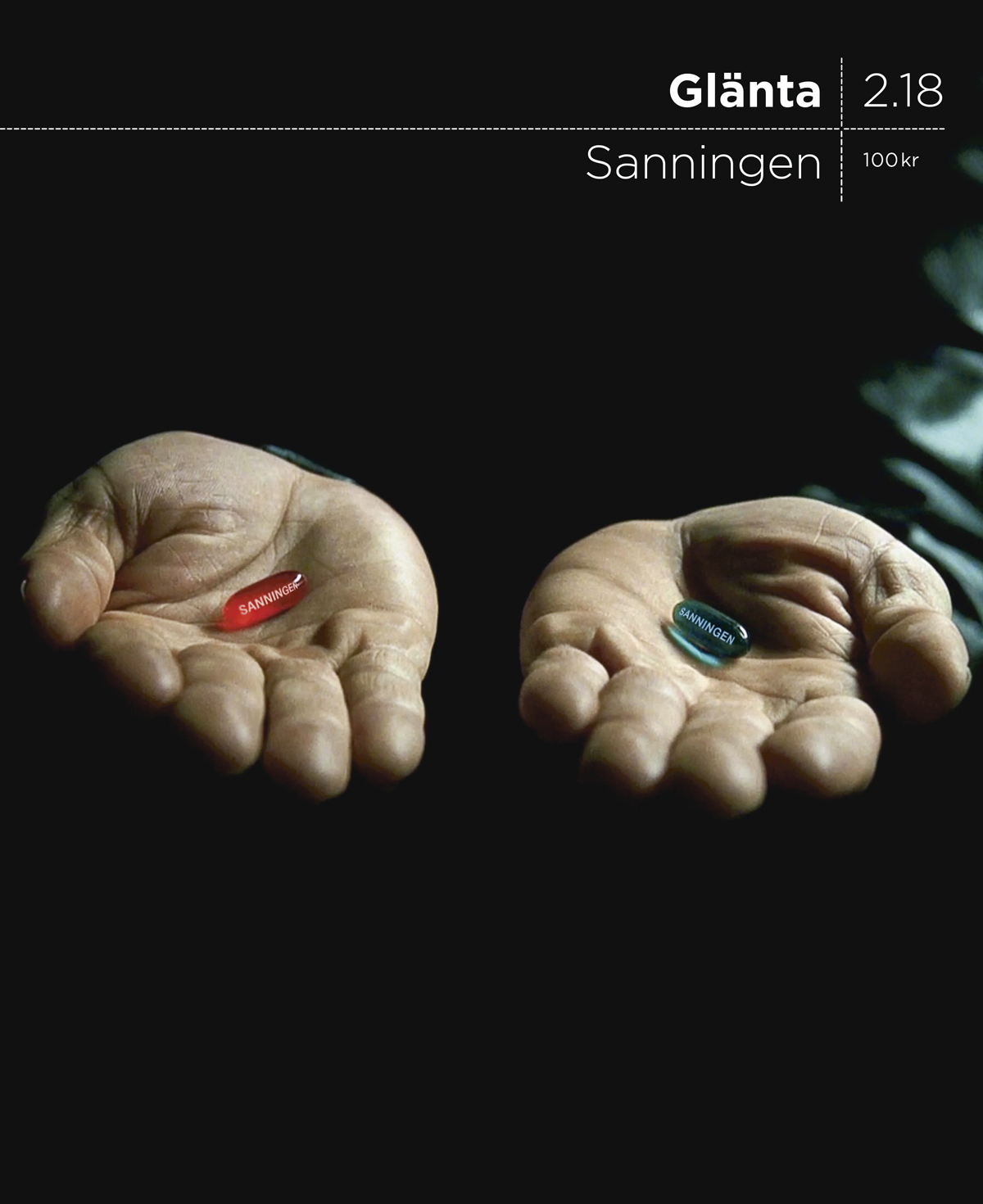
‘Often it seems like different regimes of truth stand opposed to each other’, write Göran Dahlberg and Linn Hansén, introducing the current issue of Glänta, entitled ‘Sanningen’ (‘truth’). ‘We have thought a lot about avoiding far-fetched theoretical positions. No dumb relativism. No dumb objectivism. Though neither of these is particularly appealing, it is not easy to navigate between them.’
Postmodernism: One of the more benign offshoots of the post-truth phenomenon has been a revival of the old controversy over postmodernism. ‘Truth isn’t truth,’ claimed Donald Trump’s lawyer, Rudy Giuliani, without being obviously influenced by either deconstruction or queer theory. And yet, argues historian of ideas Marci Shore writes, postmodernism does bear some responsibility for the emergence of post-truth politics.
While refusing any simple line of descent, Shore argues that postmodernism left the West philosophically and morally unequipped to deal with Putin, Trump, et al. The response to real communism among eastern European dissident intellectuals, she argues, provides better guidance on confronting the post-truth regimes of the present day than that of their contemporaries in the west. Read the article in Eurozine here.
The modern lie: Anna-Karin Selberg returns to Hannah Arendt’s dictum that ‘the deliberate denial of truth and the capacity to change facts are interconnected’. If the ‘modern lie’ is an ‘act that transforms history’, then modern truth-telling is to ‘bear witness from within the lie’, argues Selberg. ‘Introducing truth, in a situation in which it is erased, itself becomes a political action, no matter how unpolitical the witness is.’ But truth-tellers take a risk: ‘Since the liar is free to model their facts according to political interests and expectations, they will appear more credible.’
Also: Tormod Otter Johansen’s and Erik Björling’s inventory competing concepts of truth and their different functions.
More articles from Glänta in Eurozine; Glänta’s website
il Mulino (Italy) 5/2018
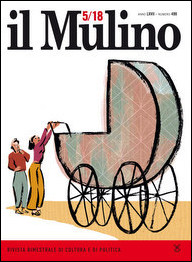
‘The combination of rising crime and the growth of the foreign population have encouraged an inaccurate and hostile image of the presence of immigrants in Italy,’ writes Marco Valbruzzi in Il Mulino. According to Valbruzzi, the gap between perception and reality, which is larger in Italy than in any other European country, is not all Salvini’s fault; nor is it solely down to ignorance. There is also a ‘lack of effective state control in the reception and integration of immigrants in the social structure of our country’.
Five Star Movement: Gianluca Piccolino, Andrea Scavo, Maurizio Pessato and Pierangelo Isernia look at the evolution of Cinque Stella from a leftwing movement into something ideologically more heterogenous. Voters’ opinions on debt, immigration, infrastructure and basic income point to a convergence between the two parties. The majority of Five Star and the Lega Nord voters oppose EU obligations on public debt, in favour of a basic income and restrictive immigration policy. Yet on several issues, including immigration, there is a split within the Five Star Movement itself. ‘Possible changes in political offerings, from both the right and the left wings, could be decisive for the alliance between the two parties and for the internal cohesion within the Five Star movement.’
Far right and the internet: Manuela Caiani analyses the use of the internet by the far-right in Europe and America, be it to recruit new members, to propagate ideology or to publicize campaigns. She notes that rightwing organizations are transnationalizing their activities, collaborating with similar groups in other countries in matters of political communication, tactics and mobilization.
Demographics: A dossier exploring the population and generational imbalances in Italy today, characterized by rising youth unemployment and an aging population.
More articles from il Mulino in Eurozine; il Mulino’s website
New Humanist (UK) 4/2018
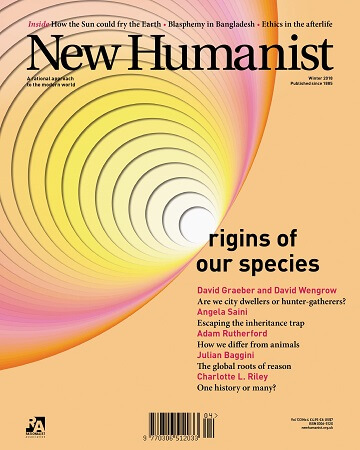
The sun could destroy all earthly technology by a flare, yet termites are solving desertification; meanwhile, primal mammals bully each other in disturbingly human ways. The Winter issue of the New Humanist explores narratives of social and biological determination, as well as early human history and the roots of philosophy.
How to change the course of human history: ‘Overwhelming evidence from archaeology, anthropology, and kindred disciplines is beginning to give us a fairly clear idea of what the last 40,000 years of human history really looked like, and in almost no way does it resemble the conventional narrative.’ And yet researchers ‘remain strangely reluctant to announce their findings to the public – or even scholars in other disciplines – let alone reflect on the larger political implications.’ David Graeber and David Wengrow examine why the myth of ‘agricultural revolution’ remains so persistent and argue that there is a whole lot more we can learn from our ancestors. Read the article in Eurozine here.
Opiophobia: ‘Fears and misconceptions have clouded around the opioid family of drugs, building up over generations of use and abuse’, writes Niki Seth-Smith in her article on the long history of opiophobia. Eighty per cent of the world’s population lack sufficient access to pain treatment, in large part because medicine is more focused around cure than care. Medical regimes are often reluctant to provide serious pain treatment. All the while, an opioid overdose tendency is causing serious problems in the US, where four fifths of the world’s opioid use happens.
Secular philosophy: ‘There is little to no prospect of the emergence of a fully secular philosophy’ writes Julian Baggini. ‘There is every prospect, however, of a distinctly Islamic philosophy which is open, tolerant and which embraces secular knowledge by making it compatible with theology. It has happened in the past and it could happen again.’
Gendered mathematics: Academic mathematics are obsessed with the ideal of the mental athlete, argues David Berry. In other words: they worship youth and arrogance, commonly associated with the romantic genius. ‘The result is a culture that … rewards male competitiveness and tolerates what often comes with it: rudeness and lack of empathy.’
More articles from New Humanist in Eurozine; New Humanist’s website
The Eurozine Review presents a selection of the latest issues of Eurozine partner journals, summarizing their contents in English as a way of encouraging cultural and political dialogue between national public spheres in Europe. Subscribe here.
Published 12 December 2018
Original in English
Contributed by Eurozine © Eurozine
PDF/PRINTNewsletter
Subscribe to know what’s worth thinking about.




